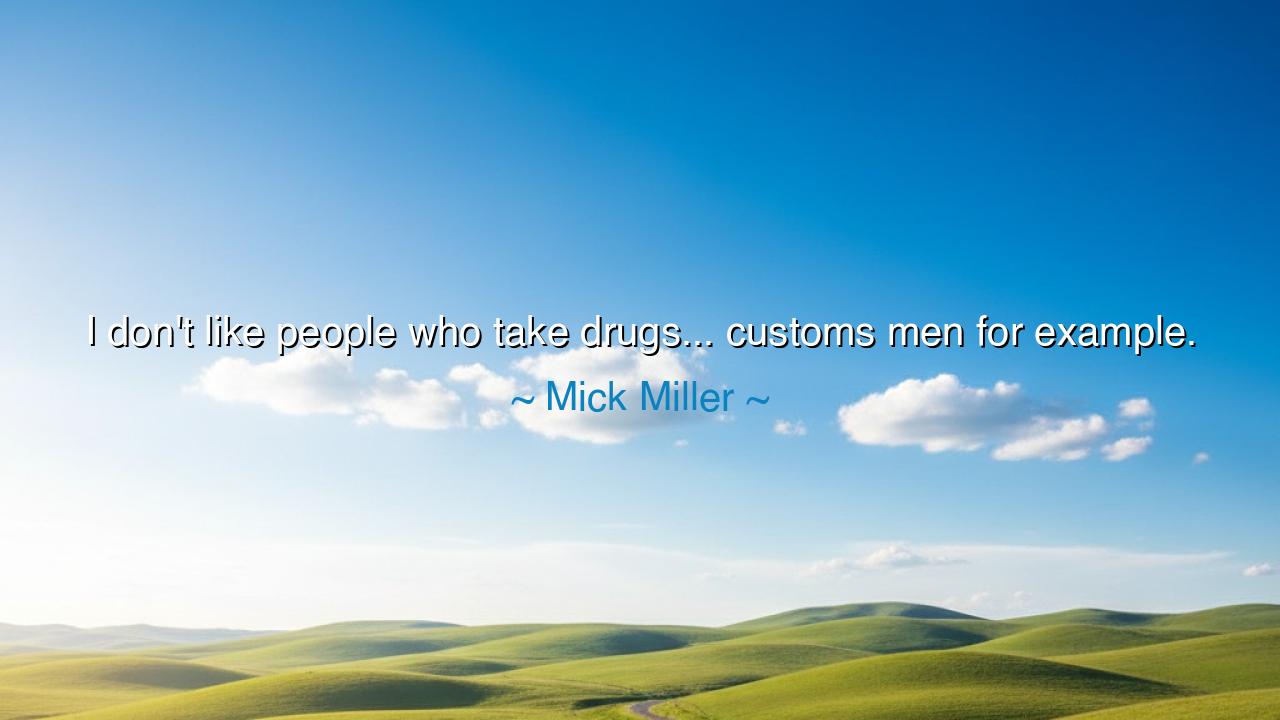
I don't like people who take drugs... customs men for example.






Hear, O children of wisdom, the words of Mick Miller, a man who, through humor and wit, has revealed a deeper truth about integrity, morality, and the hypocrisy that often pervades society. He spoke thus: "I don't like people who take drugs... customs men for example." These words, spoken in jest, reveal a biting commentary on the corrupting influence of power and the double standards that often plague those who are entrusted with authority. Miller, through his sharp observation, draws attention to the irony of a world where those tasked with maintaining order may themselves fall prey to the very vices they are meant to guard against.
At first glance, these words may seem like a simple jest, a quick and lighthearted remark. But look deeper, and they expose the contradictions of those in positions of power. Customs men, who are entrusted with the sacred duty of safeguarding borders and ensuring that the law is upheld, are often seen as the very individuals who turn a blind eye to the corruption and vice that lurk in their midst. Miller’s words are a reflection on the moral paradoxes that often arise in systems of authority, where those who are meant to act as guardians may, in fact, be the very ones who undermine the integrity of their own mission.
Consider, O children, the ancient story of King David of Israel, a man who, despite his great leadership and wisdom, was often caught in the snares of moral failing. David, in his zeal for power, once sent a loyal soldier, Uriah, to die in battle so that he might take Uriah's wife, Bathsheba, for himself. The very man who was tasked with leading a nation in righteousness fell prey to the temptations of his own desires. This story serves as a timeless reminder that even those who hold the greatest authority must remain vigilant against the temptations that threaten to corrupt their integrity.
This theme of hypocrisy in positions of power is echoed in the story of the Roman Empire, where the rulers, even as they spoke of virtue and justice, often indulged in excess and vice. Nero, the infamous emperor, was one such example. As he demanded the highest standards of behavior from his subjects, he himself indulged in luxury, corruption, and cruelty. Miller’s words about customs men reflect this deep irony—those who should uphold the law often seem to be the very ones who break it.
Miller’s humor cuts to the heart of a deeper truth: the moral fiber of a society is tested not by the words of its leaders, but by their actions. It is easy to stand on a pedestal and point out the faults of others, but it is a far more difficult and noble task to live a life of consistent integrity. Customs men, like all those who hold authority, must not only uphold the law but also embody it in their actions. Miller reminds us that the hypocrisy of those in power, those who act as judges while indulging in vice, is a betrayal of the trust bestowed upon them by the people.
The lesson we must take from this is not merely about the failings of customs men or the hypocrisy of those in power, but about our own responsibility to live with integrity in all things. Each of us is a guardian of something — our own values, the trust of others, the principles by which we live. If we are to be true to those who place their faith in us, we must not fall prey to the vices that seduce us, nor should we act in ways that contradict the values we claim to uphold. The true test of character lies not in what we demand from others, but in how we live and act in our own lives.
And so, O children, let us heed the wisdom of Mick Miller’s words, and let them serve as a reminder to remain vigilant against the hypocrisies that creep into our own hearts. Live with integrity, both in public and private, and hold ourselves accountable to the standards we set for others. In doing so, we will be true to ourselves, true to those who place their trust in us, and true to the timeless principles of honor and virtue that guide us through the labyrinth of life. Let no vice or temptation cloud your judgment, and let your actions reflect the highest ideals, so that you may live a life worthy of respect and trust.






AAdministratorAdministrator
Welcome, honored guests. Please leave a comment, we will respond soon